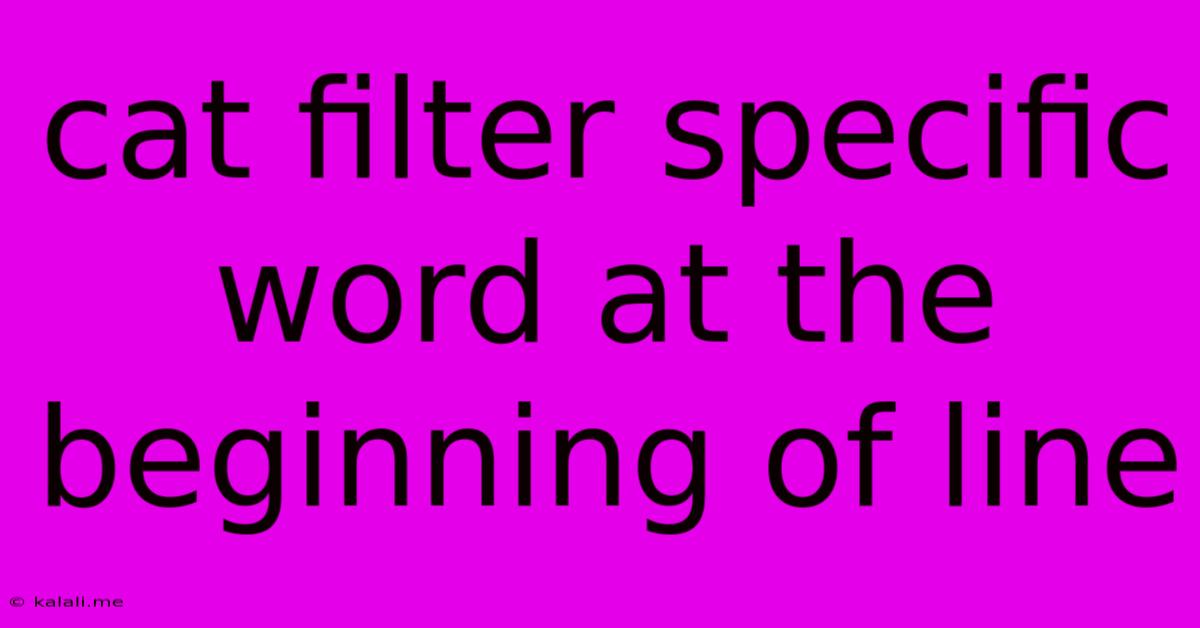Cat Filter Specific Word At The Beginning Of Line
Kalali
Jun 03, 2025 · 3 min read

Table of Contents
Cat Filter: Specific Word at the Beginning of a Line
This article explains how to create a filter that targets lines beginning with a specific word, a common task in various text processing scenarios. We'll explore different methods, from simple command-line tools like grep to more powerful scripting solutions like Python. This is useful for cleaning data, log analysis, and various programming tasks. We'll cover examples and best practices to make this filtering process efficient and accurate.
Understanding the Problem
Often, you'll encounter text files where you need to isolate lines starting with a particular word. For instance, you might have a log file where error messages always begin with "ERROR:" and you want to extract only those lines for further analysis. Similarly, you might have a data file where specific entries begin with a unique identifier. Efficiently filtering these lines is crucial for data manipulation and analysis.
Methods for Filtering Lines Starting with a Specific Word
Several methods exist to achieve this filtering, each with its strengths and weaknesses:
1. Using grep (Command-Line Tool)
grep is a powerful command-line utility for searching text. Its ^ operator matches the beginning of a line. To filter lines starting with "ERROR:", you would use:
grep ^ERROR: logfile.txt
This command searches logfile.txt for lines beginning with "ERROR:" and prints only those matching lines. This is a quick and efficient solution for simple filtering tasks.
Advantages: Simple, fast, readily available on most Unix-like systems. Disadvantages: Limited functionality compared to scripting solutions; less flexible for complex filtering rules.
2. Using awk (Command-Line Tool)
awk is another powerful command-line tool that offers more flexibility than grep. You can use a conditional statement to check if a line starts with a specific word:
awk '/^ERROR:/ {print $0}' logfile.txt
This awk script checks if a line ($0) begins with "ERROR:" and prints it if the condition is true. This is more versatile than grep but still a command-line solution.
Advantages: More flexible than grep; can handle more complex conditions.
Disadvantages: Steeper learning curve than grep; less suitable for very large files due to potential memory constraints.
3. Python Scripting (Programmatic Approach)
For more complex filtering needs or when integrated into a larger workflow, a Python script offers the most flexibility:
def filter_lines(filename, keyword):
with open(filename, 'r') as f:
for line in f:
if line.startswith(keyword):
print(line.strip())
filter_lines("logfile.txt", "ERROR:")
This Python code opens the file, iterates through each line, and checks if it starts with the specified keyword using startswith(). It then prints the line (after removing leading/trailing whitespace).
Advantages: Highly flexible and customizable; easily integrable into larger workflows; can handle very large files efficiently by processing them line by line. Disadvantages: Requires programming knowledge; involves more setup than command-line tools.
Choosing the Right Method
The best method depends on your specific needs:
- Simple filtering: Use
grep. - Moderate complexity: Use
awk. - Complex filtering, large files, integration into workflows: Use Python.
This guide provides a comprehensive approach to filtering lines starting with a specific word, equipping you with various techniques for diverse text processing tasks. Remember to choose the method that best aligns with your technical skills and the complexity of your project. Always prioritize efficiency and clarity in your chosen method.
Latest Posts
Latest Posts
-
How To Know Lower Control Arm Is Bad
Jun 04, 2025
-
How Many Feet Of Crushed Stone Under Slab
Jun 04, 2025
-
How To Remove Sliding Door From Tracks
Jun 04, 2025
-
Count Equivalent In Data Table In R
Jun 04, 2025
-
Wrodpress How To Modify The Sidebar Contents
Jun 04, 2025
Related Post
Thank you for visiting our website which covers about Cat Filter Specific Word At The Beginning Of Line . We hope the information provided has been useful to you. Feel free to contact us if you have any questions or need further assistance. See you next time and don't miss to bookmark.